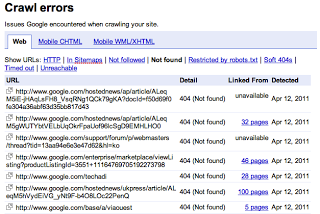2011 年 5 月 2 日 星期一
您正在思考自己的事情,使用網站管理員工具檢查自己的網站有多棒...等等!檢索錯誤網頁充滿了 404 (Not found) 錯誤!即將發生嚴重問題嗎?

別擔心,年輕的新手網站站長。我們來看看 404 錯誤,以及這些錯誤對網站造成 (或不會造成) 何種影響:
問:網站管理員工具回報的 404 錯誤是否會影響網站排名?
答:404 錯誤是網頁完全正常的部分,網際網路的瞬息萬變、新內容誕生、舊有內容終止,當內容終止,(理想狀況下) 會傳回 404 HTTP 回應代碼。搜尋引擎知道這一點。正如上文所示,我們自己的網站上也有 404 錯誤,整個網路上都能找到這些錯誤。事實上,我們確實「偏好」當您移除網站上的某個網頁時,請確保系統會傳回 404 或是 410 回應代碼 (而非soft
404)。請注意,為了讓我們的檢索器能看到網址的 HTTP 回應代碼,檢索器必須要能檢索這類網址。如果網址遭到您的 robots.txt 檔案封鎖,我們就無法檢索該網址及查看其回應代碼。您的網站上有部分網址已不存在或傳回 404 錯誤不會影響您網站的其他網址 (傳回 200 (Success)
狀態碼的網址) 在 Google 搜尋結果中的表現。
問:404 錯誤完全不會對我的網站造成負面影響嗎?
答:如果您的網站上有部分網址發生 404 錯誤,這件事本身不會有負面影響,也不會損害您的網站在 Google 搜尋結果中的呈現情形。不過,也許基於其他原因您會希望處理特定類型的 404 錯誤。舉例來說,如果部分 404 網頁其實是您重視的網頁,請務必查看我們檢索時看到 404 錯誤的原因!如果您看見正式網址拼字錯誤 (例如將 www.example.com/awesome 打成 www.example.com/awsome),很可能是有人想要連結至您的網站,但純粹是打錯字。您可以透過 301 將拼錯的網址重新導向至正確的網址,獲得該連結的流量,而不必傳回 404。此外,您也可以確保使用者到達您網站的 404 網頁後,能看到有用的資訊,協助他們找到所需內容,而不只是顯示「404 找不到」。
問:我想進一步瞭解「soft 404 錯誤」。
答:soft 404 是指網路伺服器針對不存在的網址傳回 404 (或 410) 以外的回應代碼的情況。常見的例子是,網站擁有者希望傳回 404 網頁時一併為使用者提供實用資訊,而且認為如果要向使用者提供內容,就必須傳回 200 回應代碼。但事實並非如此!您可以在傳回 404 回應代碼的同時,一併提供您想提供的內容。再舉一個例子,網站會將任何未知的網址都重新導向至首頁,而不是傳回 404 錯誤。無論是哪一種情況,對於我們理解您的網站及建立索引作業造成造成負面影響,因此請確保您的伺服器針對不存在的內容傳回適當的回應代碼。提醒您,即使網頁顯示「404 找不到」也不代表系統會確實傳回 404 HTTP 回應代碼,請使用網站管理員工具中的 Googlebot 模擬器功能仔細確認。如果您不知道如何設定伺服器傳回正確的回應代碼,請參閱網站代管商的說明文件。
問:如何判斷網址應是 404、301 或 410?
答:當您從網站移除網頁時,請考慮是否要將這些內容移至其他位置,或者您是否再也不需要將這類資料留在網站上。如果您要將該內容移至新網址,請使用 301 將舊網址重新導向至新網址。這樣一來,當使用者前來舊網址尋找內容時,伺服器即可自動將他們重新導向至相關網頁。如果您要完全移除這些內容,並且網站上也沒有相似內容可滿足使用者需求,則應針對舊網址傳回 404 或 410。目前 Google 處理 410 (Gone) 與 404 (Not found) 的方式相同,因此無論您是傳回哪一個都差別不大。
問:我大多數的 404 錯誤都是針對我的網站上不存在的奇怪網址。
這是怎麼回事?這些網址的來源為何?
答:如果 Google 在網路上找到指向您網域網址的某個連結,可能會嘗試檢索該連結 (無論內容是否確實存在)。如果 Google 嘗試檢索但找不到內容,您的伺服器「應該」會傳回 404。這類連結的產生原因,可能是因為某人連結至您網站時拼寫錯誤 (例如由 CMS 等自動產生的連結)、或由於 Google 不斷加強辨識,以及檢索嵌入 JavaScript 或其他內嵌內容的連結,因此而造成連結錯誤;或者,也可能是我們在進行快速檢查時,為了瞭解您的伺服器如何處理不明網址的而採取的行動。如果網站管理員工具針對不存在於您網站的網址回報 404 錯誤,可以放心忽略這些網址。我們並不知道哪些網址對您來說很重要,以及哪些應該是 404,因此我們會顯示「所有」在您網站上找到的 404 錯誤,讓您自行決定重要與否。
問:有人抓取我的網站內容,並在過程中造成多項 404 錯誤。這些都是內含其他程式碼的「實際」網址,例如 https://www.example.com/images/kittens.jpg" width="100" height="300" alt="kittens"/>,這是否會對我的網站產生負面影響?
答:一般來說,您不用擔心這類「無效連結」的問題對網站造成損害。我們瞭解網站擁有者幾乎無法防範其他人抓取網站內容,或是以不尋常的方式連結網站。如果您很熟悉規則運算式,可以考慮將這些網址重新導向,但基本上這種情況沒必要擔心。提醒您,如果您認為有人竊取您網站上的原始內容,也可以提出下架要求。
問:上週我修正了網站管理員工具回報的所有 404 錯誤,但我的帳戶中目前仍列出這些問題。這是否表示我沒有正確修正?要多久才會消失?
答:請查看「檢索錯誤」頁面中的「已偵測到」欄,這是系統最近一次偵測到錯誤的日期。如果該欄中的日期早於您修正錯誤的日期,代表自該日期以來我們尚未遇到這些錯誤。如果日期較近,則表示 Google 在檢索時仍持續看到 404 錯誤。
完成修正後,您可以透過 Googlebot 模擬器檢查檢索器是否看到新的回應代碼。測試幾個網址後,如果檢查結果良好,這些錯誤應該很快就會從檢索錯誤清單中消失。
問:我可以使用 Google 的網址移除工具,讓 404 錯誤迅速從帳戶中消失嗎?
答:不行;網址移除工具會從 Google 搜尋結果中移除網址,但不會從網站管理員工具帳戶中移除網址。該工具專為緊急移除要求而設計,而且網址已經傳回 404 的情況沒有必要使用該工具,因為這類網址會隨時間自然從搜尋結果中消失。請參閱這篇網誌文章的下半部,進一步瞭解網址移除工具適用與不適用的情形。
想進一步瞭解 404 錯誤嗎?歡迎前往我們的網誌查看 404 週相關資料,或到網站管理員說明論壇逛逛。
